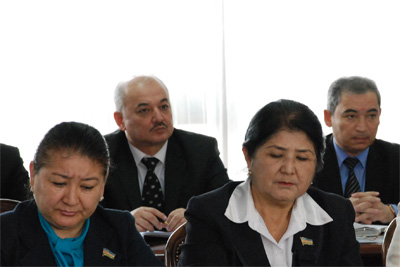
Use of ICT in economic courts discussed in Tashkent
Members of faction of UzLiDeP, employees of the Cabinet of Ministers, judges and officials of Supreme Economic Court, economic courts, State Committee on Communication, Information and Telecommunication Technologies, Chamber of Commerce and Industry, Council of Farmers, and others participated in the event.
It was noted that Uzbekistan carried out wide-scale reforms directed at improving judicial-legal sphere and ensuring full independence of the judicial power, protecting human rights and freedoms, and protecting rule of law.
The roundtable participants underlined that in recent years state bodies, controlling bodies and judges are using ICT to accept complaints and applications, communication with other, issue of decisions of courts, etc.
It was said that the proposals are developed in Uzbekistan on organization of electronic judicial process with use of video and audio, as well as new forms of recording judicial process in order to wider introduction of ICT into work of the courts.
UzLiDeP members underlined that from 1 January 2013 the businesses can submit applications and petition to the economic court in online form and from June 2013 the courts started to send their documents and letters via email to case participants. It was said it helped to save money and time of businesses and raise transparency and openness of the court process.
MPs from UzLiDeP underlined that Legislative Chamber considers a draft law “On introduction of amendments to the Economic Procedural Code of Uzbekistan”, which envisages introduction of videoconference to the activities of Supreme Economic Court of Uzbekistan.
The party members said that introduction of videoconference to the court will allow businesses, located in remote or other areas, to participate in judicial process to protect their rights. This will help to cut their expenditures and time.
Now, the norms of the Economic Procedural Code of Uzbekistan envisage that the court sessions are held in the building of the court, which considers the case. This order means that the businesses sometimes should travel to other regions to participate in the court case or appeal court of the Supreme Economic Court.
According to statistics, over 30,000 representatives of the sides participated economic courts from other regions in 2011-2013. At the same time, over 8,000 representatives participated at the work of the appeal court of the Supreme Economic Court in Tashkent. If to take into account transport, food, accommodations expenditures, the businesses have to spend large sum of money.
The participants stated that introduction of the videoconference to the work of the economic courts will ensure accessibility of the rule of law and improve activities of the courts. The videoconference will also help Supreme Court to receive citizens in remote mode.
The participants said that the draft law will improve business environment and protection of interests and rights of businesses.